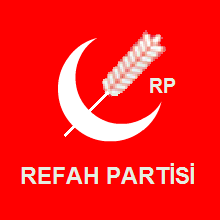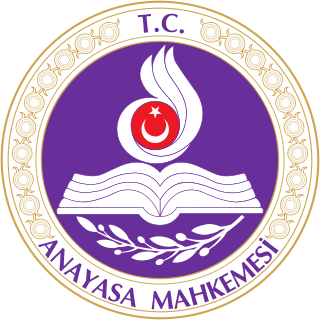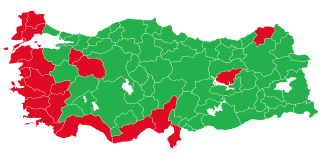
Recep Tayyip Erdoğan - is a Turkish politician serving as the current President of Turkey. He previously served as Prime Minister of Turkey from 2003 to 2014 and as Mayor of Istanbul from 1994 to 1998. He founded the Justice and Development Party (AKP) in 2001, leading it to election victories in 2002, 2007, and 2011 before being required to stand down upon his election as President in 2014. He later returned to the AKP leadership in 2017 following the constitutional referendum that year. Coming from an Islamist political background and self-describing as a conservative democrat, he has promoted socially conservative and populist policies during his administration.

Ahmet Necdet Sezer is a Turkish statesman and judge who was the tenth president of Turkey, serving from 2000 to 2007. Previously he was the president of the Constitutional Court of Turkey from 1998 to 2000. The Grand National Assembly of Turkey elected Sezer as president in 2000 after Süleyman Demirel's seven-year term expired. He was succeeded by Abdullah Gül in 2007.

The Justice and Development Party, abbreviated officially "AK Parti" in Turkish as an acronym, is a conservative populist political party in Turkey. As of 2021 the party is the largest in Turkey and has been in power almost continuously since 2003, with its leader Recep Tayyip Erdoğan, prime minister or president during most of this time, and still president as of 2021. The party suffered a setback in the 2019 local elections, losing Istanbul and Ankara and other large cities, losses attributed to the Turkish economic crisis, accusations of authoritarianism, as well as alleged government inaction on the Syrian refugee crisis.

The Welfare Party was an Islamist political party in Turkey. It was founded by Ali Türkmen, Ahmet Tekdal, and Necmettin Erbakan in Ankara in 1983 as heir to two earlier parties, National Order Party (MNP) and National Salvation Party (MSP), which were banned from politics. The RP participated in mayoral elections at that time and won in three cities Konya, Şanlıurfa, and Van. Their vote percentage was approximately 5%.

The Constitutional Court of Turkey is the highest legal body for constitutional review in Turkey. It "examines the constitutionality, in respect of both form and substance, of laws, decrees having the force of law, and the Rules of Procedure of the Turkish Grand National Assembly". If necessary, it also functions as the Supreme Criminal Court to hear any cases raised about the President, Vice President, members of the Cabinet, or judges of the high courts.
Abdurrahman Yalçınkaya is a high-ranked Turkish judge and the former Chief Public Prosecutor of the Supreme Court of Appeals of Turkey. Since the end of his term on 2011, he has been a member of the Supreme Court of Appeals' Eight Civil Department.

The 2007 Turkish presidential election refers to two attempts to elect the country's 11th president, to succeed Ahmet Necdet Sezer. The most likely candidate for president was Abdullah Gül. Turkey's presidential office is regarded as the guardian of the country's secular system; the fact that Gül's wife wears the Islamic headscarf, as well as his own history in political Islam, turned the elections into a political crisis.

The Republic Protests were a series of peaceful mass rallies that took place in Turkey in 2007 in support of a strict principle of state secularism.

A constitutional referendum on a number of changes to the constitution was held in Turkey on 12 September 2010. The results showed the majority supported the constitutional amendments, with 58% in favour and 42% against. The changes were aimed at bringing the constitution into compliance with European Union standards. Supporters of Turkish EU membership hope constitutional reform will facilitate the membership process.

Turkey's 17th general election was held on 12 June 2011 to elect 550 new members of Grand National Assembly. In accordance to the result of the constitutional referendum held in 2007, the election was held four years after the previous one instead of five.
Recep Tayyip Erdoğan, the 25th Prime Minister and 12th President of Turkey, was born on February 26, 1954 in Istanbul, Turkey.
During the Recep Tayyip Erdoğan government, civil–military relationship moved towards normalization in which the influence of the military was reduced. During its nine-year reign, the ruling Justice and Development Party, or AKP, has often faced off against the military, gaining political power by challenging a pillar of the country's laicistic establishment.

Presidential elections were held in Turkey on 10 August 2014 in order to elect the 12th President. Incumbent Prime Minister Recep Tayyip Erdoğan was elected outright with an absolute majority of the vote in the first round, making a scheduled run-off for 24 August unnecessary.
The December 2009 Kurdish protests in Turkey were five days of protests in Turkey that ensued after a December 11, 2009 ruling by the Constitutional Court of Turkey that banned the pro-Kurdish Democratic Society Party (DTP), after finding them guilty of having links to the outlawed Kurdistan Workers' Party (PKK) and spreading "terrorist propaganda."
Conservative democracy is a label coined by the ruling Justice and Development Party (AKP) of Turkey to describe Islamic democracy. Forming as a modernist breakaway party from former Islamist movements, the AKP's conservative democratic ideology has been described as a departure from or moderation of Islamic democracy and the endorsement of more secular and democratic values. The electoral success and the Neo-Ottoman foreign policy of the AKP that aims to broaden Turkey's regional influence has led to the party's conservative democratic ideals to be mirrored in other countries, such as by the Justice and Development Party in Morocco and the Ennahda Movement in Tunisia.

In the run-up to the Turkish general election of June 2015, many political parties engaged in campaign efforts to increase their vote shares. The main contesting parties were the governing incumbent Justice and Development Party (AKP) led by Ahmet Davutoğlu, the Republican People's Party (CHP) led by Kemal Kılıçdaroğlu, the Nationalist Movement Party (MHP) led by Devlet Bahçeli and the Peoples' Democratic Party (HDP) co-led by Selahattin Demirtaş and Figen Yüksekdağ. These four parties are the only parties with a realistic chance of surpassing the 10% parliamentary threshold to gain representation in the Grand National Assembly of Turkey

The political conflict between the AKP-ruled Turkish government and the Gülen movement of Fethullah Gülen began in 2013.

The 2018 Turkish presidential election took place on 24 June 2018 as part of the 2018 general election, alongside parliamentary elections on the same day. Following the approval of constitutional changes in a referendum held in 2017, the elected President will be both the head of state and head of government of Turkey, taking over the latter role from the to-be-abolished office of the Prime Minister.

The premiership of Recep Tayyip Erdoğan began on March 14, 2003, when the first Cabinet headed by Erdoğan was sworn in by the Turkish Parliament.
The People's Democratic Party closure case refers to a legal procedure during which the Peoples' Democratic Party (HDP) was threatened with a closure and hundreds of its politicians with a political ban for five years. The HDP was accused by the state prosecutor to have organizational ties with the Kurdistan Workers' Party (PKK).












